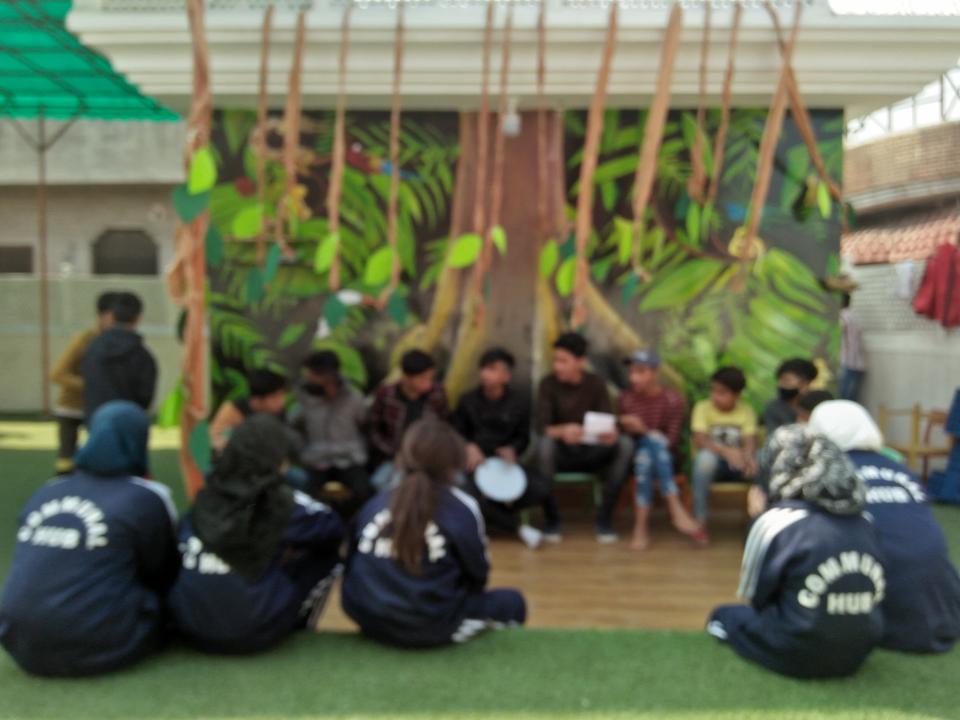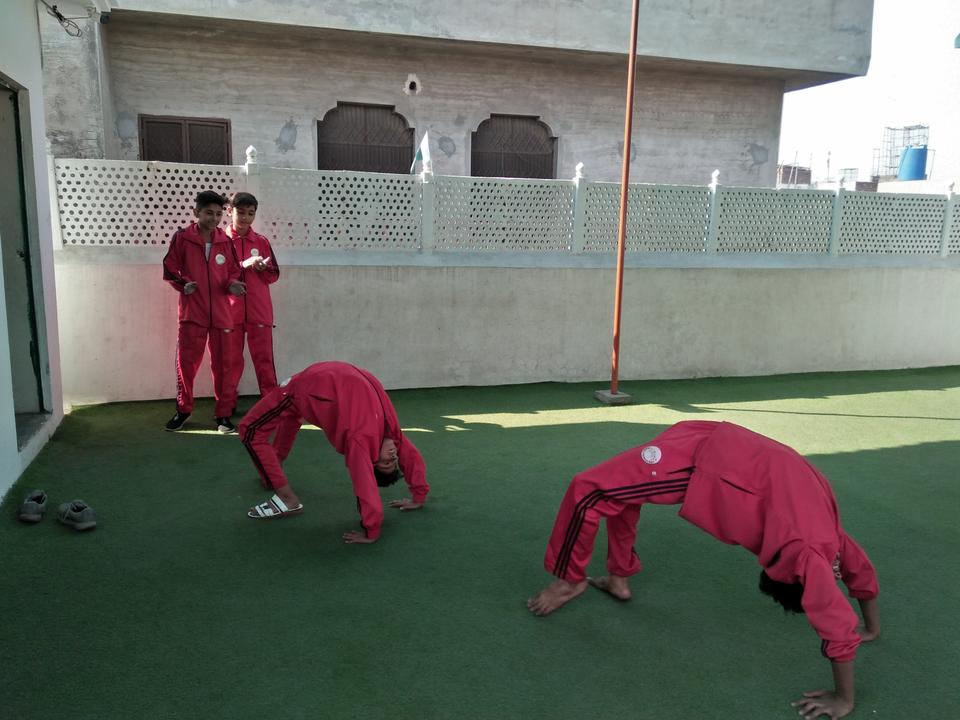Denied admission in government schools, children of sex-workers in Lahore receive education at social activist Zerka Tahir’s Learning Hub
It’s around 12 in the afternoon. And a class of 25-30 students between two to six years of age are listening attentively to their teacher Kristi (name changed). The classroom is in a three-story building in old Lahore’s Munshi Ladha neighbourhood.
Education here is informal — no age restrictions, no uniforms, no set curriculum. It’s called the ‘Learning Hub’. It’s a unique school. But then, so is the sub-context to the story of these children in Pakistan’s grand old city.
The building was once a brothel — home to courtesans, musicians, sex workers, pimps and others living on the fringe of the same society which exploits them. The students are their children.
Most of them were born out of illicit relationships, one-night stands, or women duped by men who promised marriage. Government schools in Pakistan do not admit students whose parentage does not conform to societal norms in the Islamic country.
“Without having birth and identity registration documents, these children cannot get access to either government or private educational institutions. So, all these unregistered boys and girls could do was end up joining the family profession. And that’s it,” says social activist Zerka Tahir, the brain behind the school.
With the help of non-governmental organisations, she set up the educational and skills training institute in a rented house next to the government girls’ school.
“All the children are very intelligent though they could not get opportunities to get into good schools. These children are far more talented than those studying in formal educational institutes,” Kirsti tells TRT World.
“Some are good in math, some in English and some drawing. A boy is so talented that he can draw the portrait of anyone,” she says of a young student.
Thanks to the pioneering work of Tahir and her dedicated team, the children can now dream big. “Some children want to become teachers, some doctors, or engineers or pilots,” the young teacher says, requesting that her real name is not revealed.

Identity crisis
The story of the Munshi Ladha neighbourhood is unique in itself. It was once known as the ‘Mini Heera Mandi’, a small version of Pakistan’s largest and most famous redlight area called ‘Heera Mandi’—which literally means ‘diamond market’ in the national Urdu language.
In the 1980s, when army dictator General Zia-ul-Haq seized power in Pakistan, his government launched a nationwide crackdown against those associated with the performing arts. Brothels, dance and wine bars were also shut down as he went about turning Muslim-majority Pakistan into an orthodox Islamic state.
Strict Shariah punishment, like flogging, was enforced to discourage association of the people with such professions, as part of the state-run campaign to Islamise the nation in an attempt to prolong military rule.
In eastern Lahore, Heera Mandi was closed down and all those earning a living in the locality fled to and hid in different parts of the country. Many found shelter in the nearby Munshi Ladha locality.
While these families were able to continue their profession, the parents could offer little to their children for a better future. All this was because they lacked national identity documents, since the Pakistani government only registers children in the name of their father.
In 2016, when Tahir first set up the school, they got only six from the locality to enroll because working with these families was not easy.
“Initially the mothers objected to the schools’ timings. They complained that they could not send their children to school so early because they work the whole night and sleep during the day,” Tahir reveals.
“But later on they realised the importance of education. So, today, we have 100 boys and girls aged three to six years,” she tells TRT World. “The latest enrollment is of a three-year-old girl,” she says.

From darkness to light
Monitoring the activities of the students on two LCD screens connected to 25 CCTV cameras, Tahir says: “Everyone is welcomed here. We do not discriminate against anyone. The change comes from home. So, we are changing the mindset of these people through their children. One day they will get educated and choose any other respectable profession. That is our goal and will be our success.”
On the rooftop of the school building, two small groups of minor girls and boys clad in blue and red uniforms demonstrate the tricks they have learned at the recently-introduced karate classes.
“We want to give them confidence, especially the girls, so that they can defend themselves if they get into any situation with men,” Tahir says.
As they head downstairs to the dining area for free breakfast, another group of some boys starts reciting poems to the beats of the drums.
Just beneath the playing area, computers are being arranged on the tables in a newly set up computer lab.
Grey areas
Despite giving education and behavioural training, psychologist Asma Shehzadi says that some of these children had matured beyond their ages because of the environment in which they live.
“I happened to accidentally see a TikTok video of a minor girl (barely five-year-old), whose dance gestures and poses were too suggestive,” the psychologist says, while narrating her experience of working with children of sex-workers and performers.
“When we finally traced out the kid’s family, we came to know that her paternal aunt was a dancer, so the kid was repeating exactly what she had observed at the home for years,” she says.
Shehzadi says while she might not be able to stop these children from joining the profession of their families, they have been sensitised to discern what is wrong.
Walking through the mazes of narrow streets, Tahir points to three other houses they have purchased to expand the facilities for the students. She has engaged with a cluster of non-governmental organisations that donate money, food, clothes, shoes and other articles to run the school.
In a neighbouring house, some children are trained in embroidery and making decorative items to earn their livelihood.
The dilemma of unregistered children
Some parents are also helping Tahir in her mission. Like Yasmeen, mother of one son and four daughters – all studying at the Learning Hub.
“I cook for around 300 people— students, staff and some neighbours who cannot afford to get education. I feel so happy when I cook for some 130 children three times a day,” Yasmeen, 38, tells TRT World. Her husband works at a brothel.
While the children are getting free food, education and skills training, what still remains a big challenge is securing their future by getting them registered as Pakistani citizens.
In the conservative Pakistani society, the government does not register children in the name of single mothers. The law makes it mandatory for a child to be registered in the name of their father.
But after tireless efforts, Tahira has been able to arrange for the registration of these children with the state.
“Soon, the National Database and Registration Authority (NADRA) will start registering these children with single parents as citizens,” she says.
“The NADRA will also put a picture of every child on his/her birth registration certificate to make sure they do not fall victim to human traffickers. Because, in many cases, we have learnt that smugglers show underage girls as adults through fake documents to take them abroad for sex work or dancing, etc.”
With classes about to end, the school’s principal mentions another accomplishment of theirs.
“Earlier, the neighboring government school would deny admissions to these children. But, now they have enrolled around 25 of our children in fifth grade during the last three years,” he says.
“The government school also sent two children to us in the current month to educate them,” he says proudly.












0 Comments